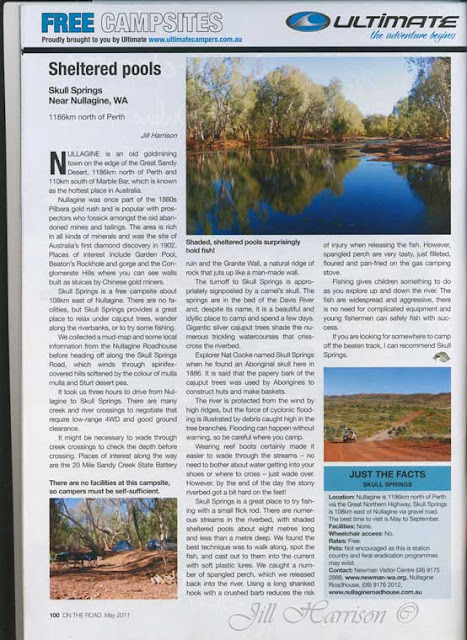Skull Springs is a free camp site located 108kms east of Nullagine - an old goldmining town on the edge of the Great Sandy Desert, 1186km north of Perth and 110 km south of Marble Bar in Western Australia (known as the hottest place in Australia).
There are no facilities, but Skull Springs provides a wonderful place to relax under the Cajuput trees, wander along the river banks, or try some fishing.
We collected a “mud” map and some local information from the Nullagine Road House before heading off along the Skull Springs Road which winds through spinifex covered hills softened by the colour of Mulla Mulla and Sturt Desert Pea.
It took us three hours to drive from Nullagine to Skull Springs. There are many creek and river crossings to negotiate that require low range 4WD and good ground clearance. It may be necessary to wade through creek crossings to check for depth before crossing. Places of interest along the way are the 20 Mile Sandy Creek State Battery ruin and the Granite Wall, a natural ridge of rock that juts up like a manmade wall.
The turnoff to Skull Springs is appropriately signposted by a camel’s skull. The springs are located in the bed of the Davis River and despite its name it is a beautiful and idyllic place to camp and spend a few days. Gigantic silver cajuput trees shade the numerous trickling watercourses that crisscross the river bed.
Explorer Nat Cooke named Skull Springs when he found an Aboriginal skull here in 1886. It is said that the papery bark of the cajuput trees was used by Aborigines to construct huts and make baskets.
The river is protected from the wind by high ridges, but the force of cyclonic flooding is illustrated by the debris caught high in the tree branches and huge trees that had been uprooted. Flooding can happen without warning, so be careful where you camp.
My full story about camping at Skull Springs can be seen in the May edition of On The Road magazine, Australia. On The Road Magazine





Beautiful .. breathtaking shots... Lovely place...!! Luv it.. !!
ReplyDelete